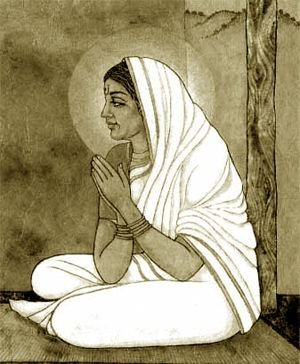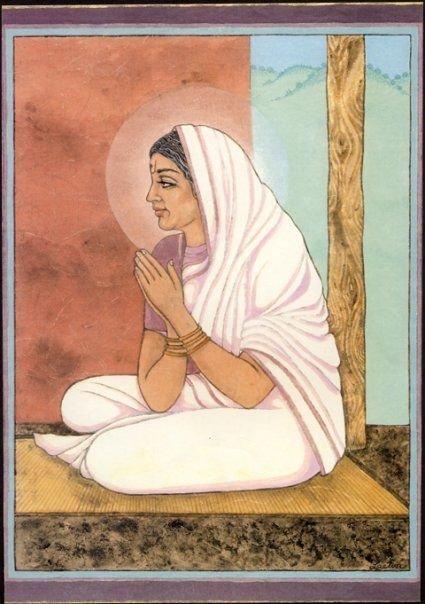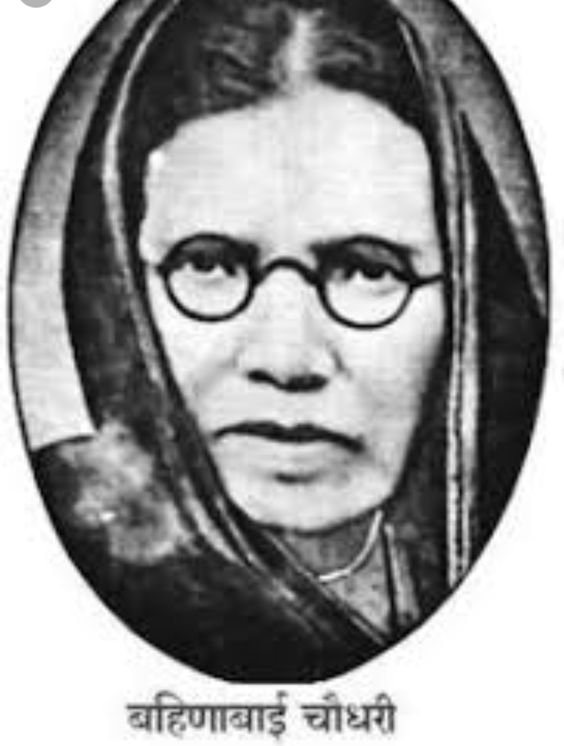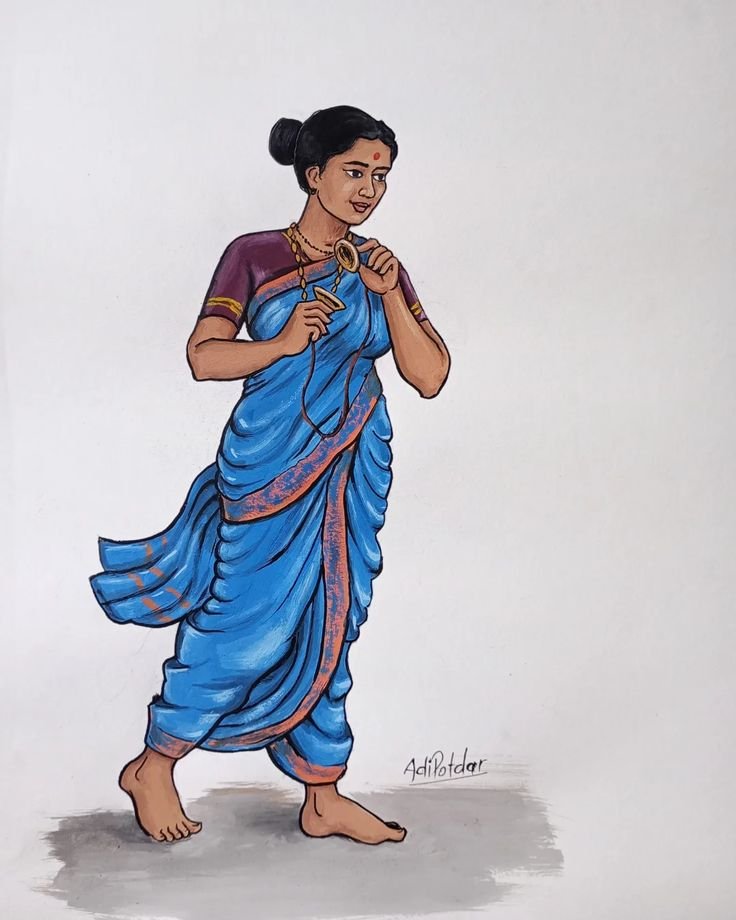Bahinabai: The Poet Emerged Out of Extreme Adversities

Bahinabai Chaudhari has been recognised and revered as a Khandeshi language poet posthumously. Her entire life was shrouded in pain and battling grievances. However, the brave lady never relinquished and kept fighting in the face of perils with absolute tenacity. Poetry became a getaway of expressing and venting her pent-up feelings and that is why you will often find her talking about mundane life and things in her poetry. Bahinabai was the epitome of resilience, determination, and a courageous woman. Her life story is truly a source of muse, motivating us to keep calmness and composure in the face of adversities.

Arey! destiny, destiny!
now my feet are tied to wheels
just as your own nine planets
are bound forever to their orbits!
May my two boys be safe and happy
is all that from God I pray
In this where does destiny figure?
What more will the horoscope say?
No, no, my dear fortune teller
don’t ask to see my palm
I know what future has in store for me
Don’t come knocking at my door!
History
Bahinabai was born in a middle-class Brahmin family on 24 August 1880 in Jalgaon, Maharashtra. She grew up with her three brothers and three sisters whom she has often mentioned fondly in her poems. She didn’t get any education since girls were not sent to school those days so, she spent her time giving a hand to her parents in household chores.
As per the prevalent customs she was married off at a tender age of 13 to a widower Nathuji Chaudhari of Jalgaon. They were a happy couple and Bahinabai has talked very highly of her husband in her poems. After a few years of marriage, the joint family of her husband had split up rendering the couple alone with their three children and a tiny piece of land and a house. However, due to the couple’s mutual understanding and love, they toiled hard for the sustenance of their family.

Ah, this married life!
Like a pan on the fire,
First, the burns sting on your hand,
But, only then do you get bread!
Ah, this married life!
Story continues below advertisement
One mustn’t belittle its institution!
You wouldn’t call the pinnacle of a temple,
A melting pot, for the sacrament it represents!”
This married life doesn’t allow
Any room for sadness or misery,
For it is a garland of flowers around your neck,
Not a burden of weight!
To make situations worse Nathuji Chaudhari passed away when Bahinabai was only 29 years old. Now, Bahinabai was left all alone with her three children – Kashi, Madhusudan, and Sopandev. On top of that her son Madhusudan had been crippled following a plague. This was the bleakest phase of her life, for she had began losing hope and will.

But Bahinabai, a cotton farmer, wiped off her tears and chose to fight. She made poetry her weapon and went up in arms challenging life and adversities. This was the time when she started composing poems, exploring the themes of marriage, farmers life, rural culture of Maharashtra, nature, religion, her in-laws, etc. These poems were jotted down by her son who really loved them. Bahinabai would diligently work in the fields composing poems and venting her bottled up feelings.
Albeit illiterate, Bahinabai had practical knowledge and was well aware of life. She was no doubt a pious woman and perceived the presence of God in the tiniest of elements however she never believed in superstitions and was staunchly against it. She has also denigrated the superstitious practices pervasive in the society back then.
Bahinabai was an ardent follower of Tukaram, Goddess Saraswati, and Appa Maharaj of Jalgaon. She was certainly blessed by Goddess Saraswati that’s why she composed such philosophical poems. Bahinabai lived in her husband’s house till her last breath. Her house in Jalgaon is till there in apple-pie order and has become a revered site visited by devotees and followers every year on 3 December to celebrate ‘Bahinabai Smriti Din’.
Bahinabai took her last breath on 3 December 1951 and achieved an eternal rest. Following her departure her son Sopandev, who himself was a poet, went to a renowned Marathi poet Acharya Atre, also known as ‘Prahlad Keshav’ to get her poems published. It is said that Acharya Atre was awe-struck by the poems of Bahinabai and called them ‘pure gold’. Finally, Sopandev, after being encouraged by Acharya Atre, published Bahinabai’s poems in 1952 in a form of a book called ‘BahinabaichiGani’ comprising 50 poems.

The desirous, desirous heart
Is like a pack of cattle in a field
No matter how much you drive it away
It comes back and settles on the crop
…God, what exactly is this heart
How was it fashioned?
Did you dream of it
While fully awake?
Achievement:
The biggest achievement of Bahinabai was her resilience and faith in herself due to which she never relinquished and kept battling grievance circumstances with equal and opposing force. She is the embodiment of valour and that is why she is remembered this date.
Her notable achievements include:
- Literary Legacy
Bahinabai many simple poems reflecting the ordinary life of the poor. The metaphors used in her poetry are pan, farm, bread, etc. These words show her connection to the grassroot people and culture. There’s a sense of poignance in her poems that you can’t ignore. She has expressed herself in a very subtle yet bold way leaving an indelible mark on anyone who reads them. She became a poet posthumously and contributed to the Khandeshi language poetry with her 50 poems.
Sarsoti is my mother
She teaches me my tongue
How many secrets she has planted
In daughter Bahina’s mind!
For me, dear Panduranga
Your Geeta and your Bhagwat
Come together in the rain
they sprout from the soil!

- A College Is Named After Her
A college in Jalgaon, earlier known as Northern Maharashtra University, was rechristened as Kavayitri Bahinabai Chaudhari North Maharashtra University in 2008, to pay homage to the divine legacy of Bahinabai. This petition for renaming was filed by Eknath Khadse, erstwhile MLA of Muktainagar. The university also has a dedicated research and study centre for the poems of Bahinabai, known as ‘Kavayitri Bahinabai Chaudhari Study and Research Centre’.
This study centre frequently conducts workshops and invites esteemed literary figures like poets, writers, and film makers.
- Her Poems Are a Part of College Curriculum
Bahinabai’s poignant and mystic poems have also become a part of college curriculum. Her poems are taught in Yeshwantrao Chavan Maharashtra Open University since 2012.
- Her Poems Getting Recognition in Flicks & on Radio
Her poems are regularly played on radio and one of her poems titled, Arey Sansar Sansar – Oh! This Married Life, was also converted into a song in a 1961 Marathi movie ‘Manini’.
- Representation of Women’s Voices
Through her poignant and simple poems, Bahinabai has beautifully and poetically expressed the struggles and aspirations of women in the ancient society thus emerging as a symbol of women empowerment and literary prowess.
Legacy
Bahinabai left this materialistic world full of adversities and perils and slept an eternal rest however her legacy is still with us in the form of her poems. Her struggles and resilience are still celebrated by millions through her heartfelt and soulful poems. Her legacy is being carried on by her great grandson Rajeev Chaudhari, who us the owner of Suchitra Prakashan, a publishing house under which her poems were first published.
Bahinabai’s poems are read not only by Indians but also by foreigners due to their English translation by American writer and professor, Eleanor Zelliot. She published the translated version of Bahinabai’s poems in 1982 in a Journal of South Asian Literature.
Another writer, Anjali Purohit, has also published the translated version of her poems as a book called ‘Go talk to the River: the Ovis of Bahinabai Choudhari’ in 2019.
Bahinabai’s poems transcend the barriers of time and culture because they talk about the mundane lives of us – the mundane people.
This sansar, o this sansar
Is like a pan on a stove
You must burn your hands
Before you earn the bread


